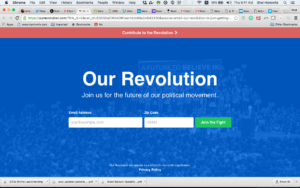Voting for the Lesser of Evils Three Times—THIS Time
Here in Massachusetts, we get to vote on some interesting referenda.
Lifting the Charter School Cap
UPDATE, OCTOBER 6, 2016: I’ve been convinced in the intervening weeks that this particular charter school vote is not one I can support. I am not convinced of the motives of this bill’s supporters, and I see a greater threat to the public schools in the way this measure is structured. Below is what I’d written on September 18, before I was really aware of the issues with how this referendum is structured. All my other points about the other issue and candidate remain accurate.
One is on lifting the current cap on charter schools. These schools are publicly funded and privately run, funded primarily by a state per-pupil allotment. They range from liberal experiments in educational democracy to corporate-sponsored throwbacks to long-abandoned educational models promoting rote learning and obedience. At the moment, 32,000 Massachusetts students are on waiting lists for charter schools.

It’s important to separate whether the charter school experiment is a good thing from the funding formula. Bias disclosure: both of my kids attended charter schools for elementary through high school, so I’m a quadruple alumni parent. It’s also worth pointing out that my wife and I both attended the same New York City high school for gifted children. This was a public school, but in many ways the experience was closer to an academic-achievement-oriented charter school in today’s world.
The switch came for us when the public school second grade teacher insisted on teaching reading by lowest common denominator. Our daughter, who had always loved school through preschool, kindergarten, and first grade, very quickly started hating it. She didn’t want to sit through whole-class reading lessons using a book with two words on each page, paced to the slowest kids in the class–and the school administration was not responsive. We moved her to Hilltown Cooperative Charter Public School, an arts-based school that emphasizes love of learning through multiple modalities–and she thrived there.
We worried that my son, five years younger than my daughter, could have been a bullying victim in the traditional public school, as I was. He was a sensitive, feminine, non-sports-playing classical musician, avid reader, and a member of a tiny ethnic minority in our town. And our town’s school culture is heavily focused on sports. But he did well in the zero-bullying-allowed culture at Hilltown. Both of my kids went on to thrive in the performing arts charter high school they attended afterward (which was, incidentally, much more ethnically and racially diverse than our town public school). My son drew on that training to attend a major music conservatory for both his undergrad and graduate studies.
Hilltown also did its best to follow its mission and be a lab school for new educational methods, which it was eager to share with other area schools. However, the school’s outreach efforts were rebuffed over and over again. My wife was on the board for a while, and she told me how almost every outreach gesture was brushed away by the local traditional public schools.
I vote an enthusiastic yes for the idea of charter schools–but the funding formula borders on criminal IMHO. Removing resources from the traditional public schools just adds to the spiral of despair, increases bureaucracy, denies resources to kids who are in many cases already begging for more, and cuts off real learning.
Yet I will vote for more charter schools–because they were there for my kids when traditional public schools failed them–but reluctantly, because I think the funding formula strikes a blow against public schools with every student who leaves. And whether or not the vote passes, I think we charter school supporters have to be part of fixing that rotten funding formula. And as a vote to give a few of those 32,000 waitlisted students the same opportunities my children enjoyed.
Recreational Marijuana
I will also vote, reluctantly, for pot legalization, though I don’t like the way the industry is moving. I see it becoming another outpost that extracts money from the poor, uses questionable marketing tactics, and encourages people to detach from reality rather than step up to the plate and work for change. It’s also likely to concentrate clout in the hands of a few big players, squeezing out any mom-and-pop businesses. And I worry about fostering a culture of chemical dependence, and of course I worry about problems when people drive while stoned.
However, we already have all of that, with alcohol. And pot is actually a much more socially benign form of blocking the real world than alcohol. Pot smokers don’t get aggressive or violent, and don’t drive nearly as dangerously, as drunks. And criminalizing this behavior causes deep and lasting damage. It:
- Ruins the lives of people who are using a much milder drug than many legal ones
- Diverts scarce law enforcement and criminal justice resources away from crimes that actually hurt people
- Causes a tremendous financial burden to taxpayers (it’s not cheap to keep someone in jail for several years) and contributes to prison overcrowding
- Builds the criminal infrastructure (alcohol prohibition was what really made the Mafia a force to be reckoned with)
- Jacks up prices to levels that may lead to property crime
Once again, I’m voting for the lesser of evils. Criminalization is a failed solution.
The Presidential Race
And yes, dammit, I will vote reluctantly for a deeply flawed Democratic presidential candidate who in many other years might not get my vote, even though I live in a “safe” state where I could vote third-party, and have voted for independent candidates in the past.
I want such an overwhelming margin of defeat for Trump’s agenda of racism bullying, misogyny, lying, cheating his suppliers, suppression of the media, egomania, etc. that he never shows his face in politics again. Let’s compare Clinton and Trump:
- She has ethics problems. He has no ethics at all.
- Fact-checkers find her among the most truthful candidates we’ve had in years (though certainly not perfect); Politifact says 50% of her claims are true or mostly true and only 13% are lies or outrageous “pants on fire” lies. He is caught in outright lies over and over again, often several times in the same speech; Politifact rates only 15% of his claims as true or mostly true and a full 19% as “pants on fire” lies.
- She is far too likely to get us into another war. He would make us a puppet of Russia’s Vladimir Putin.
- Her support of Israel’s ultra-right government is troubling. His support of anti-Arab and anti-black and anti-Latino positions is equally troubling. And his consistent egging his supporters on toward physical violence against dissenters is straight out of the Nazi playbook.
- She has a history of standing up for the rights of women and children. He embraces racial stereotyping and stands up only for the rights of his own various business enterprises—including the “right” to cheat vendors and lenders out of legitimate payment.
- She’s uncomfortable with the press. He actually bans reporters from media outlets he doesn’t like.
- She embraces secrecy in ways that make me deeply uncomfortable. He says the first thing that comes into his mind, regardless of the implications–but is the first major party candidate in decades to refuse to release his tax returns, which makes me wonder what he’s hiding.
- She has been accused of manipulating the results in certain primaries, of peddling influence to benefit her foundation, and other ethics issues. But he has had a lawsuit filed against him and a business associate accusing them of rape of a minor, a state attorney general’s investigation into his own foundation and multiple lawsuits regarding fraudulent practices at Trump University
I could go on and on. If you want more, start with longtime political observer Adolph Reed’s article, Vote for the Lying Neoliberal Warmonger: It’s Important. And to those on the Left who say a Trump presidency would revitalize the opposition, I would respond that repression doesn’t often create a climate of change. For every success like the freedom struggles in South Africa and India, there are many more like Prague Spring being crushed by the Russians–where the hopes and reams of the people are squashed like bugs. We didn’t see a popular uprising during Reagan’s or even George W. Bush’s presidency; why would we suddenly see one under Trump and his suppression of the press?
In other words, I find myself facing the lesser-of-evils in three different votes on my November ballot. And while I can’t say I’m OK with it, I find voting for the lesser evil better than the non-action that triggers the greater evil. Better still: taking action to get voting reforms so we no longer need to vote lesser-evil.









